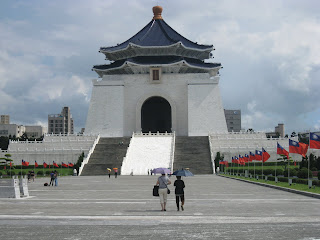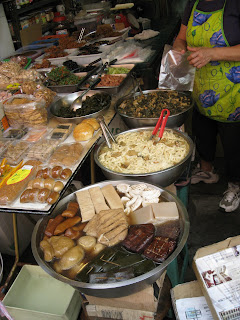
After visiting Longshan Temple in the morning, my guide suggested we take a quick look at the Chiang Kai-shek Memorial since it was on the way to where we were going.
While visiting the memorial, I learned a little bit more about Chinese/Taiwanese politics. Taiwan is divided by two political parties - the blue party is for the movement toward uniting with China, and the green party is against it. Due to controversy over Taiwan's relationship with China, and since Chiang Kai-shek is a former president of the Republic of China, recent government leaders from the green party have renamed the memorial without his name, which is now "National Taiwan Democracy Memorial Hall." The complex as a whole is now named "Liberty Square."


Inside the building up the steps is a huge statue of Chiang Kai-shek, which I learned was debated over whether or not to remove him completely.
The unification with China is a hot topic, and the Taiwanese people I spoke to were all against it (although there are no doubt people who favor it as well). Nevertheless, everyone seems to grimly acknowledge that it is something that is happening, gradually, step by step. Due to a supposed scandal with the last president, the current president that got elected is in favor of the unification with China.
Taiwan's independence is a complex issue; according to my guide, Taiwan has never been a part of China. Reading more about it on wikipedia, I learned that viewpoints on the issue range from believing that Taiwan has always been independent to the fact that it has always been a part of China.
After we visited Liberty Square, we went to a press conference for the festival. The festival organizers talked in Chinese while we sat and the press took photos. After that, we had some extra time before the opening night film started, so a group of us walked around the area.









Scooters such as these are the most popular means of transportation.

Although as a pedestrian, you always have to keep on the look out. People can drive them just about anywhere, including narrow and crowded open air markets such as this one.



These black eggs are supposedly called "steel eggs," because they're cooked in soy sauce until they get really hard. I had a chance to try one and it was pretty good.
We came a cross a second temple, much smaller than the one we went to in the morning.




This woman is burning paper replicas of money, which my guide told me that people burn so that their loved ones can use it in the afterlife.


Paper replicas of objects are also frequently burned to send to the spiritual world - telephones, TVs, cars, planes, and houses.
After that, we went to the theater for opening night.

The festival had flown in three other filmmakers besides myself - from France, Italy, and Thailand. Here I am with two of the filmmakers and one of the programmers from the festival -






























